Football is diseased beyond recognition - is Covid-19 its unlikely cure?
- benpawlowski
- May 31, 2020
- 4 min read
Updated: Jun 2, 2020
If you ask a group of football fans the question of when football peaked, a wide range of answers would be sure to follow. Some would look towards the 1960's, the days of England's sole World Cup triumph, gloriously muddy pitches and post-match drinks with your side's rough-tackling centre back. Others may suggest later on, perhaps the 1990's, when the introduction of worldwide television coverage of football matches allowed fans to watch the world's very best in action, from Ronaldinho to Zinedine Zidane. What may surprise you though is the likely omission of one key era of football by all- the present. Football fans the world over are experiencing a common sense of disillusionment with the sport they adore. The beautiful game, like the world it entertains, is ill - but is the current situation, the Covid-19 pandemic that has brought the world to a tumbling halt, its unlikely vaccine?

Football's roots are distinctly working class. Teams originated from factories and pits, and games on the Saturday acted as a welcome relief from the stresses and strains of working life in industrialised Britain. These roots, thankfully, were preserved as the decades rolled by. Football sides from deeply industrial cities, such as Liverpool and Manchester, flourished, and the terraces remained the working classes' second homes. Tickets were cheap, the game unsanitised, as footballers with modest wages gave their all, sporting missing teeth and messy mullets. It was a game that belonged to the people.
This form of football is barely recognisable to the one we know today. The game has rapidly transformed - like a butterfly, it has broken its cocoon, but its wings sport an ugly colour. Once a game for the masses, football is now a bare-faced ultra capitalist vanity project for the elite. Colossal TV rights, extortionate wages, biblical transfer fees and eye-watering image rights have become the norm. The ordinary working class man has been priced out, others exploited and abused by the monetisation of passion. Players have changed too. Once rough round the edges and characterful, the majority have become glossy, media-trained Ken dolls. Even some of the fundamentals of the sport itself have been damaged in recent years. Diving and feigning injury is widespread, and the cataclysmic introduction of VAR has done little to adhere itself to the game's fans.
These changes form a basis of the common consensus among football supporters - the game is diseased. Once a game based on passion, integrity and natural skill, it is now devoid of these basic principles. It is simply yet another money-making machine for the powers at be, who will drain every single dollar out like milk from a cow's udder.

Football and its fans can be viewed in terms of an abusive relationship. Football lets us down time and time again, and it isn't what it once was, but we are still lured back in, because simply, we love the game. But still, amongst all the hateful perfections and misdemeanours of the modern game, there remains the spark that made football the world's most popular sport, loved by millions upon millions upon millions the world over. The feeling of celebrating a goal, falling down innumerable rows of seats with your mates. The joy of watching a fantastic piece of skill, or a beautifully executed pass. The raw emotion that you feel when your team nicks a last minute winner, or hold on for the three points, despite a period of added time that at one point seemed infinite. These moments, and the hormones and adrenaline that they give us, is why we are addicted. And this is exactly why there is still hope for a better future for football.
Football, at its basics, is still the sport we love and adore vigorously; we still spend the week before a match nervous with anticipation; our mood for the weekend is still dependent on our side's result; we still sing our players' names, even if they are paid beyond any reasonable level fathomable. Frankly, the money is futile when these emotions still exist. No pound note could ever quantify the feeling of a last minute goal, deep into injury time. Yet, the game could be better, and the ongoing Covid-19 pandemic gives us a darkly ironic opportunity to treat the game we love, and repair it for the better.

For too long, football supporters have been mistreated by the powers at be. Whether its unfair ticket prices or ghastly kick off times, fans are viewed as an unnecessary distraction from the 'true' value of football - to make money. Perhaps now, as the Premier League prepares to play games behind closed doors, both clubs and broadcasters will realise the importance of the match-going fan. The atmospheres will of course be non-existent, and this will likely make the game devoid of much of the excitement it normally has, even if what happens on the pitch remains the same. Maybe, with this, us supporters may be treated fairer in the future - cheaper tickets to allow in fans of all social backgrounds, along with some much needed care and attention when selecting games for live broadcast.
Aside from the everyday supporter, Covid-19 may have an additional effect on the finances that have flooded the game since the turn of the Millennium. A deflation in transfer prices, in line with world markets is highly likely. Coupled with a lack of owner investment, caused by suffering businesses, transfer fees and wages may fall further, perhaps to a level representative of 10 years ago, or so. Controlling the amount of money in the game (imagine early-Thatcher monetarism, but good) may see a return to an era where football was somewhat proud of its roots, unlike the present where they were dug up and discarded long ago. A pathway to a fairer game, the one we all fell in love with, is open. We just need to make sure to take the right turn.
31 / 05 / 2020







Comments